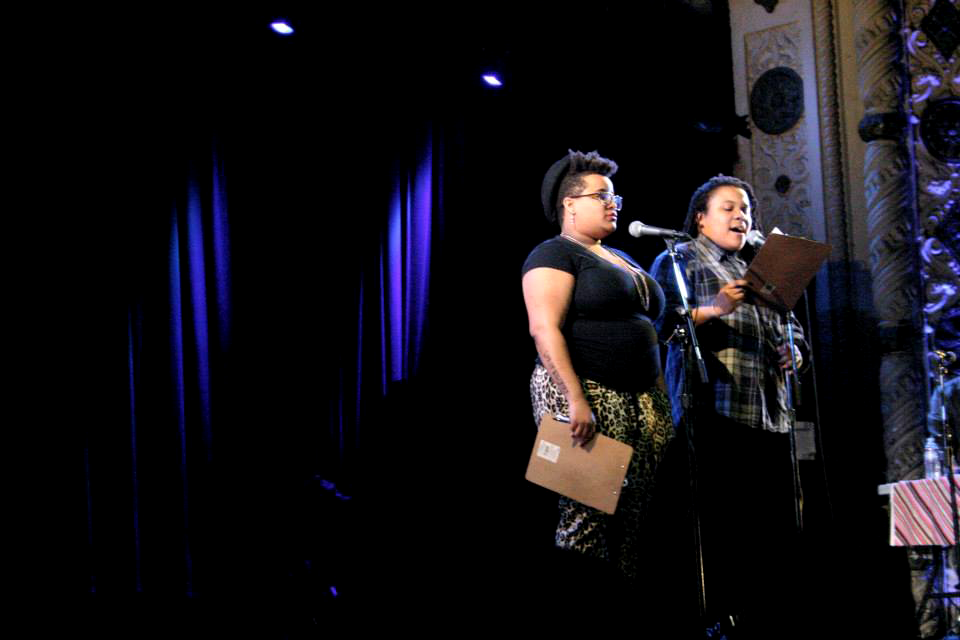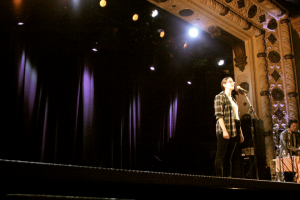
If you hear me, say, ‘Hey oh!’ ” Dominique Chestand shouts, singsong, from the lip of the stage at the Metro in Wrigleyville. The audience, still filing in, delivers the requested exchange. “You are my family!” Chestand continues. “This is my living room!”
She says this to keep the tone comfortable, to keep the space welcoming, in spite of the words about to be spouted into it.
In a hushed corner of the otherwise booming venue, a group of students gathered to prime those very words. It was the semifinal of the 2014 Louder Than a Bomb (LTAB) slam poetry competition, and members of team InVerse, from the University of Chicago Lab Schools, stood face to face, practicing a group piece.
Suddenly, Chestand called for a representative from each team.
All five current members of InVerse are girls. Their poems are about the struggles of interracial relationships, mental health, and balancing maternal relationships with growing up. They came here for themselves.
Three years ago, a group of Lab School girls showed up without a coach to an all-coaches meeting held at Young Chicago Authors (YCA) in Wicker Park. There was no formal program at the Lab School at the time. However, they had already acquired all the funding and faculty representation they needed by their own efforts. The girls—led by current senior Emma* and former Lab School student Stefania Gomez, who now attends Brown—were looking to mount the final hurdle: finding themselves a coach.
Nina Coomes, a former LTAB participant and a student at the University of Chicago at the time, heard about the Lab School girls’ bold appearance at the YCA meeting from her high school coach, Nora Flanagan. Coomes coached the girls on her own until she pulled in Natalie Richardson, also a UofC student, this past year.
“I had no intention of coaching,” Coomes said, “but I think they have a really unique team. There’s just something so amazing to me about a group of young people deciding to do something regardless of whether or not they have the structure or the means to do it. It just really worked out.”
Emma, a senior, was part of that group that went to Wicker Park. “I remember it was just this couch and this upstairs apartment,” she says. “And there were people from Whitney Young, people from a bunch of different high schools and they all had like really interesting names, like code names for each other, and YCA has since grown to be this really powerhouse organization, but I always remember just that little couch and being very enthralled by the idea of a community of youth poets in Chicago.”
Homegrown and self-run, InVerse made slam poetry a creative outlet for the students at the Lab School, a bridge for the arts amid the academics so prominent at the school. The girls had, quite suddenly, built a podium for poetics of their own—one from which they could add their voices to the accelerating trend of slam in Chicago.
Like much of the slam poetry in the competition, the girls’ poems fall mainly on the side of personal struggle, with expositions on societal ills and the larger racial tensions and violence scarring Chicago’s streets.
But slam poetry for Team InVerse is also an exercise in balance. The elite private school has connections to wealth and privilege that almost no other Chicago high school does (Mayor Emanuel sends his kids there). The girls have to balance freedom of expression with an understanding of privilege, community with competition.
Senior Maddy Anderson said, “We’re conscious of our privilege to the extent that weren’t not going to get up and do a poem about something that they [other schools] don’t have.”
The team started as a way for high school students to share their voice with Chicago, to join a wide-ranging urban youth community. It’s since become a defining part of these girls’ lives.
Liza Edwards-Levine, a freshman in her first year on the team, speaks to this idea. For her slam is first and foremost “a way of sharing really intimate things about myself in really personal safe closed spaces and being in this super-big, diverse viewing community.”
The act of writing itself also is important. “Any time that you’re able to forge a connection in any kind of way through your art, especially an art that’s so typically closeted,” Emma says, “that’s just a really important thing, especially for youth.”

At the Metro, the members of Team InVerse sit close beside one another, fingertips meeting in unison to snap their approval for each competing poet. Team Inverse ends up coming in third, which effectively disqualifies them from advancing further in the competition. There was disappointment, and some questioning of the judge’s calls. But, “it’s kind of like a saying in LTAB that the competition is a trick or an illusion or ruse,” Emma says, smiling. On stage, Chestand echoed something similar, “Ready to hear who won this bout?” she bursts out to affirmation from the crowd. “That’s a trick!” She quickly follows up: “Everybody won this bout!”
It’s a sentiment largely shared by the other girls as well. “The competition was no means why I joined LTAB,” Hsee says. Though she later adds: “But it’s definitely a part of how we practice.”
Says Edwards-Levin: “I have friends who do sports teams and I do want to feel like that this is just as legitimate as that is, and I think that there is something about that competition aspect that can be motivational and bring some excitement and togetherness to the act of making poetry.” In short, the competition seems necessary. It adds an element of excitement. But it’s not everything.
Chestand comes back onto the stage and the audience dies down. She surveys the crowd for a moment, and then brings it home. “You haven’t written your first poem,” she says calmly, “until you’ve told your first truth.”
* Note 10/26/22: The story uses a pseudonym because the person interviewed was a minor and did not want to be identified.
